
Rush was a Canadian rock band that primarily comprised Geddy Lee, Alex Lifeson (guitar) and Neil Peart. The band formed in Toronto in 1968 with Lifeson, drummer John Rutsey, and bass guitarist/vocalist Jeff Jones, whom Lee immediately replaced. After Lee joined, the band went through several line-up changes before arriving at its classic power trio lineup with the addition of Peart in July 1974, who replaced Rutsey four months after the release of their self-titled debut album; this lineup remained intact for the remainder of the band's career.

Exit... Stage Left is the second live album by the Canadian rock band Rush, released as a double album in October 1981 by Anthem Records. After touring in support of their eighth studio album Moving Pictures (1981), the band gathered recordings made over the previous two years and constructed a live release from them with producer Terry Brown. The album features recordings from June 1980 on their Permanent Waves (1980) tour, and from March 1981 on their Moving Pictures tour.

Rush in Rio is a three-disc live album by Canadian band Rush, released on October 21, 2003. The album is also available as a two DVD set. With the exception of the last two tracks on the third disc, the album was recorded at Maracanã Stadium in Rio de Janeiro on the final night of the Vapor Trails Tour. The other two tracks were taken from previous shows on the same tour. "Between Sun & Moon" was recorded at the Cricket Wireless Pavilion, Phoenix, Arizona, on September 27, 2002, and "Vital Signs" was recorded at the Colisée Pepsi, Quebec City, Quebec, on October 19, 2002.

A Show of Hands is a live album by the Canadian rock band Rush, released in 1989. The band released a video of the same name, originally on VHS and LaserDisc, the same year. A DVD version was released as part of a box set in 2006, and as an individual DVD in 2007. In 2015 it was reissued after being remastered by Sean Magee at Abbey Road Studios following a direct approach by Rush to remaster their entire back catalogue.

Different Stages is a live album by Canadian rock band Rush, released in 1998. The bulk of the first and second discs were recorded at the World Music Theatre in Tinley Park, Illinois, during the 1997 Test for Echo tour. Five other songs from various stops along the tour were included and three songs from the 1994 Counterparts tour. The third disc is taken from a performance at the Hammersmith Odeon in London during the A Farewell to Kings tour in 1978.

"Tom Sawyer" is a song by Canadian rock band Rush, originally released on their 1981 album Moving Pictures as its opener. The band's lead singer, bassist, and keyboardist, Geddy Lee, has referred to the track as the band's "defining piece ... from the early '80s". It is one of Rush's best-known songs and a staple of both classic rock radio and Rush's live performances, having been played on every concert tour since its release.
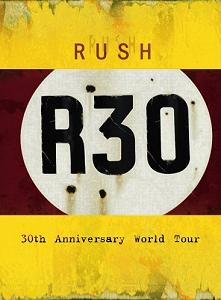
R30: 30th Anniversary World Tour is a live DVD by the Canadian rock band Rush, released on November 22, 2005 in Canada and the US, and November 28, 2005 in Europe. The DVD documents the band's R30: 30th Anniversary Tour, and was recorded on September 24, 2004 at the Festhalle Frankfurt, Germany.

The Spirit of Radio: Greatest Hits 1974–1987 is a compilation album by Canadian rock band Rush, released on February 11, 2003. It includes many of the band's most popular songs from their Mercury Records era, but does not feature any material from their third album Caress of Steel. A special edition of the album included a DVD containing music videos for several songs, including "Mystic Rhythms".
"Xanadu" is a song by the Canadian progressive rock band Rush from their 1977 album A Farewell to Kings. It is approximately eleven minutes long, beginning with a five-minute-long instrumental section before transitioning to a narrative written by Neil Peart, which in turn was inspired by the Samuel Taylor Coleridge poem Kubla Khan.
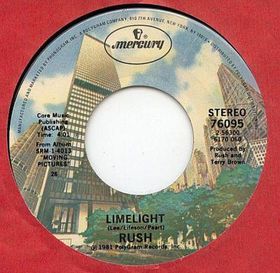
"Limelight" is a song by Canadian progressive rock band Rush. It first appeared on the 1981 album Moving Pictures. The song's lyrics were written by Neil Peart with music written by Geddy Lee and Alex Lifeson. "Limelight" expresses Peart's discomfort with Rush's success and the resulting attention from the public. The song paraphrases the opening lines of the "All the world's a stage" speech from William Shakespeare's play As You Like It. The band had previously used the phrase for its 1976 live album. The lyrics also refer to "the camera eye", the title of the song that follows on the Moving Pictures album.

Exit... Stage Left is a concert film by the Canadian band Rush that premiered on MTV in February 1982 and then released on CED, Laserdisc, Betamax, VHS and DVD at various times between 1982 and 2007. It documents a live concert performance by the band on their 1981 Moving Pictures tour. In October 1981, the band released an audio album of the same name of the same performance at the Montreal Forum, in Montreal, Quebec on vinyl LP, audiocassette, 8-track cartridge and (later) compact disc. The video has a different track list from the album, as well as voice-over comments from the band members about songwriting and performing. The four songs from the European dates of the Permanent Waves tour, included on the audio album, are not included on the video.
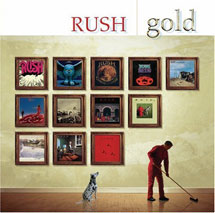
Gold is a compilation album by Canadian rock band Rush, released on April 25, 2006.

Snakes & Arrows Live is a live double CD and DVD by Canadian band Rush. The CD was released on April 14, 2008, in the UK and on April 15, 2008, around the world. It was also released on DVD and Blu-ray on November 24, 2008. The material was taken from two performances during the first leg of the Snakes & Arrows Tour, recorded at the Ahoy Arena in Rotterdam, Netherlands on October 16 and 17, 2007. The album features nine of its 27 tracks drawn from Snakes & Arrows.
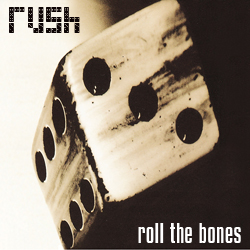
"Roll the Bones" is a song by the Canadian rock band Rush. It was released as the second single from their 1991 album of the same name.
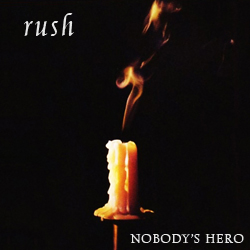
"Nobody's Hero" is a song by Canadian progressive rock band Rush, released as the third single from their 1993 album Counterparts. The first verse deals with the AIDS-related death of a gay man named Ellis Booth, a friend of Neil Peart when Peart lived in London. After the chorus, the second verse speaks of a girl who was murdered in Peart's hometown, Port Dalhousie and was the daughter of a family friend, as remembered by Peart in Far and Wide: Bring That Horizon to Me! The girl is rumoured to have been Kristen French, one of Paul Bernardo's victims.

"Dreamline" is a song by the Canadian rock band Rush. It was released as a single and on their 1991 album Roll the Bones. The song peaked at number one on the U.S. Mainstream Rock Tracks chart, and was a staple for live performances by Rush, having been performed on every tour from the inaugural Roll the Bones Tour until the 2010 and 2011 Time Machine Tour, when it was dropped. It was performed during the subsequent Clockwork Angels Tour, where it was accompanied by the Clockwork Angels string ensemble and a video with a dedication to Neil Armstrong. It was dropped again on the 2015 R40 Tour. In live performances, the bridge was extended to incorporate a solo by Alex Lifeson.
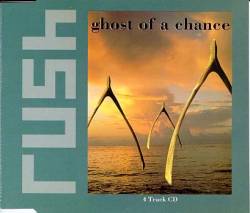
"Ghost of a Chance" is a song by the Canadian rock band Rush released as the third single from their 1991 album Roll the Bones. The single peaked at No. 2 on the U.S. Album Rocks Track chart. The lyrics focus on finding love, and as its strength over any other force.

Rush Through Time is a compilation album by Rush, released in Europe as a picture disc only in 1979. The compilation contained selections from the band's second, third, fourth, and fifth studio albums. The album was subsequently repackaged as a standard vinyl album with a colour sleeve and updated graphics on the back cover in 1982.

"Headlong Flight" is the second single from Canadian rock band Rush's 19th studio album, Clockwork Angels. It was released to radio stations and for online preview on April 19, 2012, and became available digitally and on disk April 24, 2012. A lyrics video was also made available on YouTube. In an interview with Rolling Stone, Geddy Lee commented on the song:
'Headlong Flight' was one of those songs that was a joy to write and record from beginning to end. Alex [Lifeson] and I had blast jamming in my home studio one day before the second leg of the Time Machine tour, and I did not revisit that jam until a year later. Alex and I assembled the song to be an instrumental and its original title was 'Take That Lampshade Off Yo Head!,' but once we saw the lyrics Neil [Peart] had written, I knew that the spirit of the lyrics matched the instrumental perfectly and it was just a matter of making them fit and writing the melodies.
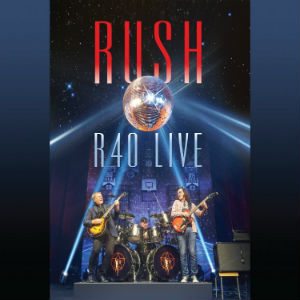
R40 Live is the last live audio album release and the last live video release of Canadian prog-rock band Rush, recorded on their high-grossing R40 Live Tour. Both formats were released November 20, 2015. The performances were filmed on June 17 and 19, 2015, at Air Canada Centre, Toronto, Canada. R40 Live is noted for containing the live debut of "Losing It", from the band's record "Signals". During set 1 of all disc formats, Benjamin Mink is featured as the guest violinist. The album's common description, written by Philip Wilding, states: "The version [of Losing It] on the Signals album was raised ever higher by Ben Mink’s...wonderfully affecting violin part, the recreation of which had always put the song beyond the band’s live set."



















